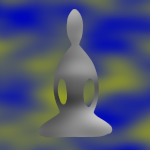Dear Friends,
Concluding this dive into Sally Armstrong’s talk, “Facets of Equanimity,” and this exploration of equanimity as an expression of wisdom, and in particular into the notion of karma (kamma).
Sally read a passage from Thanissaro Bhikkhu,
instead of promoting resigned powerlessness, the early Buddhist notion of karma focused on the liberating potential of what the mind is doing at every moment. Who you are–what you come from–is not anywhere near as important as the mind’s motives for what it’s doing right now. … our measure as human beings is not the hand we’ve been dealt, for that hand can change at any moment. We take our own measure by how well we play the hand we’ve got.
~ Noble Strategy: Essays on the Buddhist Path, Karma
Sally says from this that the Buddhist notion of karma is not fatalistic. Our intentions are key.
However, our intentions aren’t a “get out of jail free” card. Sally comments:
Often we can have good or mainly good intentions and still cause harm. We can say or do something, and for whatever reason, especially if there’s a cultural misunderstanding around differences of experience, we say something and it causes harm. Then there’s impact. We have to acknowledge that. The intention comes backs into play in how we hold and respond to the feedback about the impact that we had.
We’ll all make mistakes in our lives. We’re imperfect. …
We try to hone or encourage the best of those intentions, the wholesome intentions. But we will cause harm. How we respond to that is how this karmic wheel keeps unfolding. We need a lot of sensitivity and compassion. … [We need] the humility to recognize that we don’t always know what’s right, what’s appropriate, or what’s the best way. …
There has to be humility and understanding – and a willingness to change. Do what we need to do to make this a more diverse and vibrant and healthy and representative community.
I think this is an important part to remember about intentions and equanimity. We do the best we can in the moment, and then we learn what we can do better. We do this with the help of a balanced, equanimous mind, that can hold what happens with enough space so we can allow wisdom to guide us.
Guided meditation: Guy Armstrong gave some instructions and led a forgiveness practice, which can be a supportive way help our hearts open to equanimity in ways we have harmed or been harmed. (17 minutes instruction followed by a guided practice)
https://www.dharmaseed.org/teacher/79/talk/58838/
Feel free to share your reflections or comments below, or by email. (I’m on retreat this weekend, so I won’t be able to respond until later on Sunday.)
With warm wishes,
Andrea
